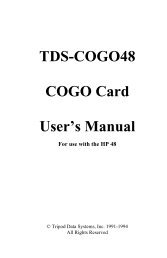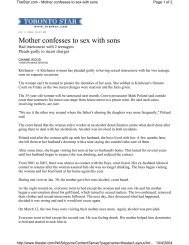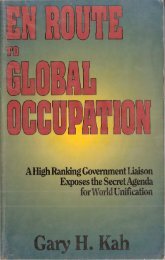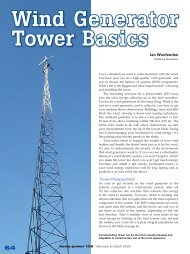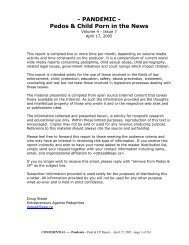G. Edward Griffin - The Fearful Master - PDF Archive
G. Edward Griffin - The Fearful Master - PDF Archive
G. Edward Griffin - The Fearful Master - PDF Archive
You also want an ePaper? Increase the reach of your titles
YUMPU automatically turns print PDFs into web optimized ePapers that Google loves.
certainly eradicated by Secretary-General U Thant. Speaking on April 5, 1963, at<br />
Columbia University, he said:<br />
Not so long ago, there were quite divergent views in the membership of<br />
the UN about the desirability and wisdom for governments to set targets<br />
and adopt national plans or programs. Today . . . there is a broad<br />
measure of agreement about the usefulness of projections, planning<br />
and programing as practical tools for economic and social development,<br />
while the controversy about the relative merits of private enterprise and<br />
public undertakings is transcended by the realization that the most<br />
important aim of development is to bring about expansion and change<br />
for the benefit of all. 12<br />
Translated into simple, understandable English, Thant said that everyone in the UN<br />
agrees that socialism is more practical and desirable than free enterprise.<br />
<strong>The</strong> socialistic bias of the UN is clearly revealed on nearly every page of the monthly<br />
United Nations Review. One can find reports on UN proceedings dealing with setting<br />
prices, production quotas, inventories, stockpiles of raw materials, labor standards, wages<br />
and monetary policies. Every conceivable sphere of human economic activity is being<br />
analyzed and then planned for so that it will come under the ultimate control of the United<br />
Nations.<br />
As the months slip by and as we enter into thousands of additional treaties, executive<br />
orders, and international agreements, the silken thread continues to be spun around the<br />
sleeping giant. <strong>The</strong> job is so near completion that already there are a multitude of United<br />
Nations regulations that reach right down to the daily lives of American citizens. An<br />
example is the International Wheat Conference which actually decrees how much wheat<br />
our farmers may sell in foreign countries and sets the price to be paid for it. <strong>The</strong> Federal<br />
Government enforces these decrees by the authority derived from an international<br />
treaty. 13<br />
<strong>The</strong> International Materials Conference is another example. Set up in 1951, its purpose<br />
was to clamp down import and export quotas for certain strategic materials such as<br />
sulphur, copper, zinc and tungsten. During the Korean War, we found that these quotas<br />
severely hampered the production of critical war materials and resulted in costly layoffs in<br />
some industries. When a subcommittee of the United States Senate looked into the<br />
matter, it reported:<br />
. . . in effect, the International Materials Conference, an unauthorized<br />
group of persons in other countries, dictated to the United States how<br />
much of such critical materials could be allocated to the United States<br />
stockpile.<br />
<strong>The</strong> so-called "entitlements of consumption" established by the<br />
International Materials Conference created a shortage of critical<br />
materials in this country for the benefit of foreign powers. . . .<br />
When the Senate received this report, it immediately withdrew authorization for the use of<br />
funds to be used in support of the IMC. <strong>The</strong> executive department under President<br />
Eisenhower, however, completely ignored the action and merely diverted the funds from<br />
other sources for this purpose. <strong>The</strong> justification used was that the IMC derived its authority


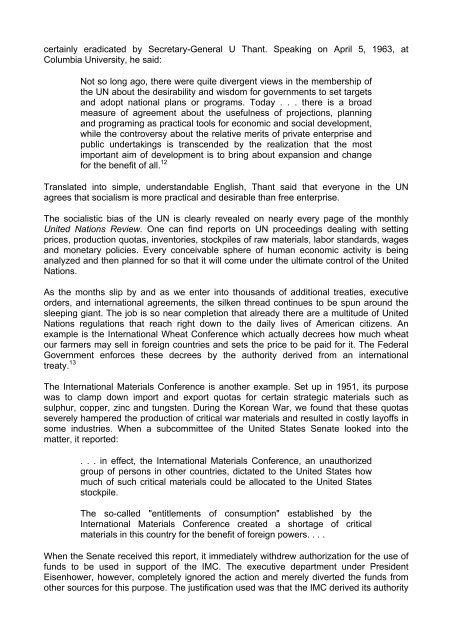
![Robert T McQuaid [rtmq@stn.net] Sent: Friday, October 29, 2004 12 ...](https://img.yumpu.com/51070071/1/190x245/robert-t-mcquaid-rtmqstnnet-sent-friday-october-29-2004-12-.jpg?quality=85)

